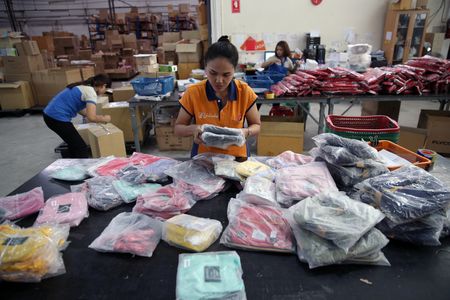By Panarat Thepgumpanat and Chayut Setboonsarng
BANGKOK (Reuters) – Thailand has recorded a 20% drop in low-quality imports, mostly from China since introducing steps to curb cheap Chinese imports that were hurting business in Southeast Asia’s second-largest economy, a government spokesperson said on Monday.
Cheap goods from China have upended local manufacturing and businesses, contributing to a slew of factory closures and job loss, with business calling for government action.
Government spokesperson Sasikarn Wattanachan said that after tightening regulations and inspections in July, the country’s low-quality goods’ import value drop significantly. Measures had been imposed to crack down on imports that did not meet local standards, focusing on agricultural, consumer and industrial goods, she told Reuters.
The government also seized 506 million baht worth of imports including counterfeit goods, shirts, shoes and e-cigarettes, according to official data.
In addition, Thailand began levying a 7% value-added tax (VAT) in July for goods under 1,500 baht ($44). So far, the Finance Ministry says it has collected 707 million baht.
The tax does not appear to have affected consumers as imports have continued, senior customs official Kitjaluck Srinuchsart said.
Shipments of goods valued below 1,500 baht from e-commerce platforms more than doubled from last year, surging to 113.7 million units, according to customs data provided to Reuters that has not been made public yet.
Those imports were valued at 24.9 million baht, 50.4% more than the previous year.
For some businesses, the measures may have come too late.
Banchob Pianphanitporn, 56, owner of Ben’s Socks, said that the measures were too slow. His sales in June to October were down 80% annually.
“Customers used to come for cheap socks – 120 baht to 130 baht a dozen, but they’re gone… They’re buying Chinese ones at 75-85 baht a dozen then turnaround to sell them 10 baht a pair,” he said.
Government official Sasikarn said there will be more measures to support Thai businesses, including requiring foreign online businesses to incorporate in Thailand and register to pay VAT.
($1 = 33.7400 baht)
(Reporting by Chayut Setboonsarng and Panarat Thepgumpanat, Editing by Hugh Lawson)

